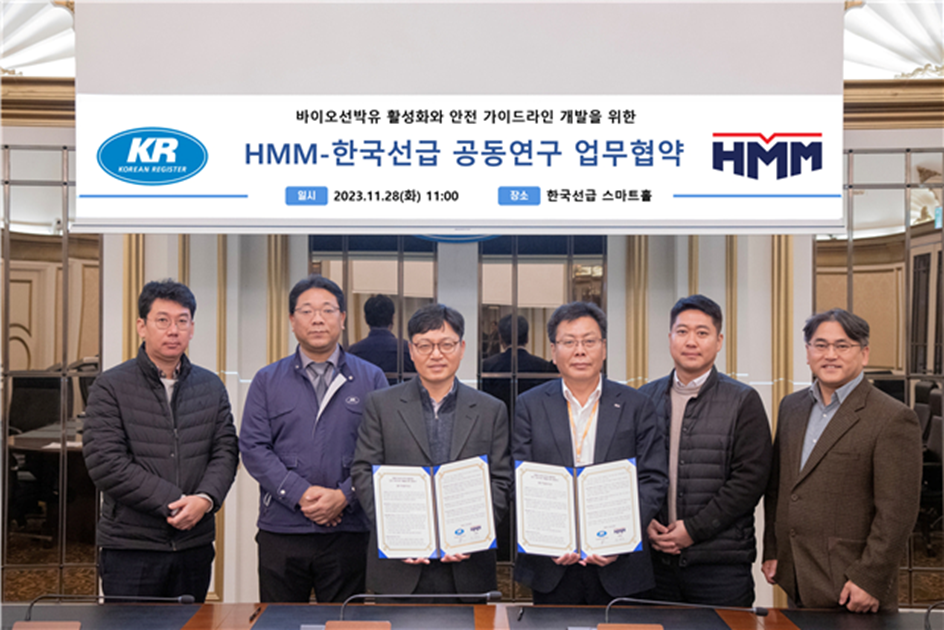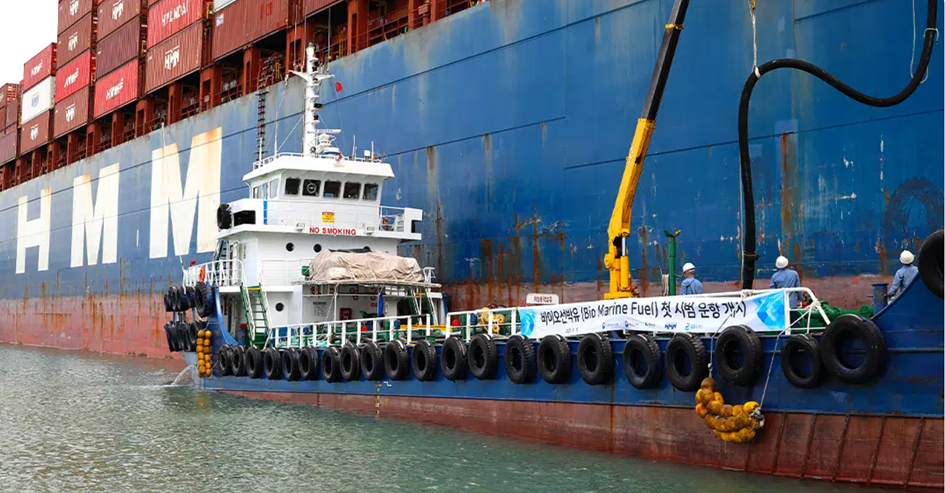-
- New Year’s Speech 2024
- KR Teams up with HD Hyundai to Develop XR-based Ship Education and Training Program
- KR-Avikus-HMD Collaborate to Develop Test Procedures for HiNAS Control
- KR Awards AiP to HD Hyundai Marine Solution, HD KSOE and HD E&T for the Methanol Dual Fuel Retrofit Design
- KR Publishes New Edition of Decarbonization Magazine
- KR Grants DongHwa Entec and DongHwa Pneutech Approval in Principle (AiP) for Ammonia Fuel Supply and Re-liquefaction System
- KR Grants PanOcean ‘ISO 45001’ Certification
- Ms. HEO Eunjung, KR Senior Surveyor, Honored with Letter of Commendation for the First IMO Gender Equality Award
- Mr. LEE Seungku, General Manager of KR Legal Affairs Team, Concludes Successful Three-Year Term as Chairman of the IACS Expert Group on Law
- KR Hosts The 34th ISM/ISPS/MLC and PSC Regular Seminar
-
- Procedural Instruction for SEEMP Part III Verification and Company Audit
- Procedural Manual for Override and use of Power Reserve on Ships Installed with SHaPoLi/EPL
- Amendments (07-23) to the International Maritime Solid Bulk Cargoes Code
- Notice for Amendments to the KR Technical Rules (Guidance for Autonomous Ships)
- Establishment of the “Guidelines for Shaft Generators”
- New Year’s Speech 2024
- KR Teams up with HD Hyundai to Develop XR-based Ship Education and Training Program
- KR-Avikus-HMD Collaborate to Develop Test Procedures for HiNAS Control
- KR Awards AiP to HD Hyundai Marine Solution, HD KSOE and HD E&T for the Methanol Dual Fuel Retrofit Design
- KR Publishes New Edition of Decarbonization Magazine
- KR Grants DongHwa Entec and DongHwa Pneutech Approval in Principle (AiP) for Ammonia Fuel Supply and Re-liquefaction System
- KR Grants PanOcean ‘ISO 45001’ Certification
- Ms. HEO Eunjung, KR Senior Surveyor, Honored with Letter of Commendation for the First IMO Gender Equality Award
- Mr. LEE Seungku, General Manager of KR Legal Affairs Team, Concludes Successful Three-Year Term as Chairman of the IACS Expert Group on Law
- KR Hosts The 34th ISM/ISPS/MLC and PSC Regular Seminar
- Procedural Instruction for SEEMP Part III Verification and Company Audit
- Procedural Manual for Override and use of Power Reserve on Ships Installed with SHaPoLi/EPL
- Amendments (07-23) to the International Maritime Solid Bulk Cargoes Code
- Notice for Amendments to the KR Technical Rules (Guidance for Autonomous Ships)
- Establishment of the “Guidelines for Shaft Generators”
-
- New Year’s Speech 2024
- KR Teams up with HD Hyundai to Develop XR-based Ship Education and Training Program
- KR-Avikus-HMD Collaborate to Develop Test Procedures for HiNAS Control
- KR Awards AiP to HD Hyundai Marine Solution, HD KSOE and HD E&T for the Methanol Dual Fuel Retrofit Design
- KR Publishes New Edition of Decarbonization Magazine
- KR Grants DongHwa Entec and DongHwa Pneutech Approval in Principle (AiP) for Ammonia Fuel Supply and Re-liquefaction System
- KR Grants PanOcean ‘ISO 45001’ Certification
- Ms. HEO Eunjung, KR Senior Surveyor, Honored with Letter of Commendation for the First IMO Gender Equality Award
- Mr. LEE Seungku, General Manager of KR Legal Affairs Team, Concludes Successful Three-Year Term as Chairman of the IACS Expert Group on Law
- KR Hosts The 34th ISM/ISPS/MLC and PSC Regular Seminar
-
- Procedural Instruction for SEEMP Part III Verification and Company Audit
- Procedural Manual for Override and use of Power Reserve on Ships Installed with SHaPoLi/EPL
- Amendments (07-23) to the International Maritime Solid Bulk Cargoes Code
- Notice for Amendments to the KR Technical Rules (Guidance for Autonomous Ships)
- Establishment of the “Guidelines for Shaft Generators”
Dr. KIM Chongmin / Senior Surveyor of Safety Research Team
Dr. CHOUNG Choungho / General Manager of System Safety Research Team,
Dr. SONG Kanghyun / Senior Vice President of DecarbonizationㆍShip R&D Center
The International Maritime Organization (IMO), at its 80th session of the Marine Environment Protection Committee (MEPC), approved the ‘Interim Guidance on the use of Biofuels under Regulations 26, 27 and 28 of MARPOL Annex VI (DCS and CII) [MEPC.1/Circ.905]’, which enters into force on 1 October 2023. This means that the use of biofuel in place of conventional fossil fuels will be recognized as a reduction in GHG emissions from ships as a source in the IMO's Carbon Intensity Index (CII) assessment.
Bio marine fuel is defined by the International Maritime Organization (IMO) as marine oil made from biofuels with a carbon emission reduction of at least 65% compared to conventional fossil fuels. The shipping industry has identified biofuel as a realistic alternative to conventional fossil fuels, so there is a lot of interest in it.
The Carbon Intensity Index (CII) is an air quality regulation implemented by the International Maritime Organization and is defined as "an index of the amount of carbon dioxide emitted to transport one ton of cargo one nautical mile (1,852m)." Based on the operating performance in 2023, from 2024, ships of 5,000 gross tons or more will be assigned an A to E rating based on the Carbon Intensity Index (CII). Meanwhile, ships that maintain a rating below a certain level may be restricted from operating.
The International Maritime Organization (IMO) estimates that about 35% of all ships will be classified as A to B, and about 35% of ships will be classified as D to E.
For the convenience of shipowners, KR is conducting the Carbon Intensity Index (CII) verification service through the greenhouse gas portal system 'KR GEARs'.

▲ HMM-KR Joint Research Agreement to Promote Bio Marine Fuel and Develop Safety Guidelines
[Source, KR]
Meanwhile, on 28 November, KR and HMM signed a Memorandum of Understanding (MoU) for 'Joint research to promote eco-friendly bio marine fuel and develop safety guidelines'.
The MoU aims to promote bio-based marine fuel, jointly develop safe operation technology, and develop safety guidelines to respond to greenhouse gas regulations (e.g. CII, etc.).
HMM is conducting Korea's first bio marine fuel pilot by bunkering B30 (30% biofuel blend) on the 6,400 TEU container ship ‘HMM TACOMA’ on 15 September 2023. HMM expects to reduce greenhouse gas emissions by about 24 per cent through the introduction of bio marine fuel and plans to gradually expand its use to about 5 to 10 percent of its total annual fuel consumption.

▲ GS Caltex-HMM Launches First Bbio Marine Fuel Pilot [Source, GS Caltex 2023.9.15. https://gscaltexmediahub.com/news/press/pressrelease-gsc-hmm-bio-marine-fuel/]
Through the MoU, KR will jointly conduct a risk assessment of bio marine fuel operations with HMM and aim to develop safety operating guidelines reflecting the results and will also cooperate with HMM in the formation of a bio marine fuel expert council, as well as in the establishment of a system to support the growth of the bio marine fuel market and the removal of regulations.
